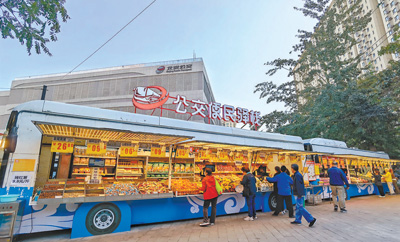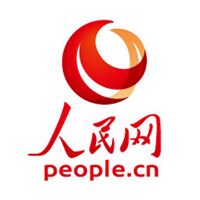 |
The bus convenience post is located on Lianbao Road, Liuliqiao, Fengtai District, Beijing.
Photographed by Wang Chao |
This year's Report on the Work of the Government proposes to ensure and improve people's livelihood, and strengthen and innovate social governance. In recent years, China has continuously improved its social governance system, improved the social governance system of co construction, co governance and sharing, and improved the effectiveness of social governance. This edition focuses on "strengthening and innovating social governance" and launches a series of reports, which fully reflects the innovative practices in social governance in various regions.
——Editor
In March, walking in Hepingli North Street, Chaoyang District, Beijing, on the north side of Liufang Bus Station, a blue and white fruit and vegetable stand stood out.
Looking closely, this stall is unusual - it has an antenna attached to its head and wheels on its feet. It turned out that this "small vegetable market" was transformed from a bus, and the big characters on the top of the carriage - "Bus Convenience Posthouse" were particularly eye-catching.
How will the unique scenery of the small "Bus Convenience Posthouse" in the city inspire urban governance? The reporter recently approached the bus convenience post to decode the new practice behind the new business.
How to attract passenger flow?
Convenient and cheap, ingenious location of post house, more professional cooperation and operation
"Peas are worth two and five, zucchini is worth one and nine, and raking oranges is worth five and six..." At 7 a.m. on the north side of Liufang bus station, the staff opened the windows and set up the shelves. A bus parked on the roadside changed into a "fresh food supermarket".
The 30 square meter carriage is divided into four stalls. On the third shelf, green and fresh spinach, green and prickly cucumber, and plump and ruddy tomatoes are all lined up, which is very lively. Soon, the neighborhood gathered in twos and threes.
"The location here is convenient, and the prices of fruits and vegetables are also cheap." Grandma Li, who lives near her home, sent her grandson to school, and took a stroll to the post house to pick vegetables. "The fruits and vegetables here are delicious, and the prices are cheaper than those in the surrounding supermarkets. I will come to buy them every two days."
During the time of speaking, the residents who came to buy were in an endless stream. "There are no less than 120 categories on the shelves every day, and they will be sold out on the same day when they are delivered." Bagging, weighing, and checkout...... Master Fan, the salesperson, is busy, opening at 7 a.m. and closing at 10 p.m.
"Convenient and cheap", the voice of the people, condenses the mind of the operator.
The site selection is ingenious. With Posthouse as the center, facing south, it is close to Liufang Bus Terminal, with frequent traffic; To the east, the subway station is less than 100 meters away, with a large flow of people; And then expand outward, radiating tens of thousands of residents in five large communities within one kilometer, as well as schools and hospitals. "The superior geographical location not only facilitates the citizens, but also ensures the passenger flow." Wu Hongwei, the operation director of Beijing Public Transport Convenience Posthouse Project, said that they had measured on the spot at the intersection, and there were about thousands of people every hour at the intersection where the Posthouse is located.
More professional operation. "Posthouse adopts the mode of cooperation between bus companies and professional third parties." Wu Hongwei explained that the station resources of the former plus the supply chain resources of the latter make the price of goods sold 10% - 20% lower than the market price, bringing tangible benefits to residents.
The bus turns into a convenient post house, turning the corners of the station into "silver corners in Phnom Penh". Taking Liufang Convenience Posthouse as an example, since its opening at the end of March last year, it has served about 210000 people and sold nearly 350000 kilograms of vegetables and fruits in less than a year. "The daily turnover can reach about 10000 yuan, equivalent to the level of an 80 square meter fruit and vegetable supermarket," said Wu Hongwei.
Where does creativity come from?
What is lacking and what is needed, integrate into the quarter hour convenient life circle, and promote the transformation of public transport services
Mature one and operate one. Now, the exploration of public transport convenience post is gradually being pushed forward.
"In the past year, there have been 23 public transport post houses that have been put into operation or trial operation, covering 7 urban areas of Beijing, with a cumulative passenger flow of about 730000 people." Wu Hongwei said that during the Spring Festival this year, many post houses such as Liufang, Maguanying, Nanhu Canal, etc. were not closed, the supply of goods was in constant gear, and the price of goods was not raised. From February 10 to 17, the passenger flow of post houses for convenience exceeded 16000 people, It has become a "good heart" of many people's neighborhoods.
The number of stack points is increasing, and the service category is also expanding. In the southwest corner of the Maguanying Bus Station, Liuliqiao, Fengtai District, Beijing, there are four buses that have been converted into a convenient post, not only fruits and vegetables, meat, cold drinks and other goods, but also nutritious breakfast, self-service laundry, ten yuan haircut and other convenient services. After a series of renovations such as removing fences, paving floor tiles, building steps and installing seats, the internal corners of the once closed on-site stations have taken on a new look and become a neat corner park.
"Based on the principle of 'what is lacking makes up for what', and starting from the actual needs of residents in surrounding communities, we continue to extend the service tentacles of the post house." Yang Yue, the business director of the Infrastructure Administration Department of Beijing Public Transport Group, told reporters that last July, the group carried out a major survey to mobilize employees to enter the community, visit residents, and do research. Half of the respondents hope to open fruit and vegetable stores, restaurants Hair cutting, sewing and other needs follow. It is precisely according to these needs that the project team "one stack, one policy" enriches and updates the functions of the post and provides more accurate convenience services for the citizens.
The public transport convenience post houses scattered in many urban areas of Beijing, while accelerating their integration into the quarter hour convenient life circle, also record the transformation of traditional public transport.
In 2022, 12 departments, including the Beijing Municipal Bureau of Commerce, jointly issued Several Measures to Accelerate the Construction of a Fifteen Hour Convenient Life Circle and Promote the Transformation and Upgrading of the Life Service Industry, which proposed "to tap space resources such as transportation terminals, parks, parks", emphasized "public service enterprises such as buses and subways, sorted out and opened their own space resources, and laid out convenience stores (community supermarkets) And other convenient commercial service facilities ".
"We have more than 700 bus stations, all over the city. Taking this opportunity, we can build a convenient platform by integrating corner resources, which can not only fill the gaps in community convenient services, open up the" last mile "of people's livelihood services, but also help public transportation transform from urban public transport providers to public service providers." Yang Yue told reporters that at present, With bus stations as the support and convenient post houses as the main body, by providing citizens with one-stop service experience from transportation to life and leisure, station centered micro life circles are accelerating to form.
How to develop continuously?
Further optimize the operation mode and improve the management level
Is the new business model sustainable for the cross-border operation of public transport companies? Where will the bus that turns into a "vegetable market" go in the future?
"The public transport convenience post not only solves the problem of people's difficulty in buying vegetables, but also expands the public transport business services, realizing a win-win situation and making new exploration for the innovative use of urban space," said Ma Liang, a professor at the School of Public Management of Renmin University of China.
In fact, in the construction of a quarter hour convenient life circle, in addition to the transformation of buses, there are many innovative explorations around. For example, the civil air defense tunnel has been transformed into a science popularization corridor, and the pedestrian walkway has become a "tidal stall"... In recent years, some places have realized "one point for multiple purposes, one store for multiple functions" by revitalizing internal resources and improving space utilization. In Ma Liang's view, promoting the sustainable development of these new formats is conducive to maximizing the use of idle space, time periods and resources, so as to realize the redevelopment and reuse of urban space.
How to make the new business form sustainable and advantageous and not become a "flash in the pan"?
On the one hand, it depends on the continuous innovation of social governance.
"For new business forms such as public transport and convenient post, relevant departments should strengthen supervision, guide and standardize their healthy development." Ma Liang proposed that, at the same time, they should also provide a relatively loose and inclusive institutional environment and cultural atmosphere for such innovation, encourage more relevant entities to participate in it, so that urban governance and public services will be more convenient and beneficial to people.
"Selling fresh food on modified buses is a pioneer. The planning, construction and operation of each depot need to be linked with several departments to handle relevant licenses and permits." Wu Hongwei expects that the relevant departments can issue relevant rules to promote the convenience service business as soon as possible, so as to help the convenience post of public transport to be landed in more street communities.
On the other hand, the business entity also needs to act actively.
"After a year of operation, the project has basically achieved the goal of 'low profit and sustainability'. To go a long way, scale effect must be formed." Yang Yue introduced that, in the next step, the Public Transport Group will further optimize the operation mode, improve the management level, strive to ensure that "one by one", and build the post into a comprehensive intelligent service platform based on the public transport network, Strive to complete the construction of hundreds of stack points in the city in the future and become an important part of the quarter hour convenient life circle.
In the early morning of March 19, Anheqiao Post House was opened for trial operation amid the sound of selling. It was the third post house in Haidian District and the 24th post house in Beijing for public transportation convenience. The newly upgraded two buses bathed in the morning light, beautifying the streets, gathering popularity and bringing convenience to more neighborhoods.
People's Daily (March 29, 2024, version 19)
(Editor in charge: Yue Hongbin, Niu Yong)
Share to let more people see





































